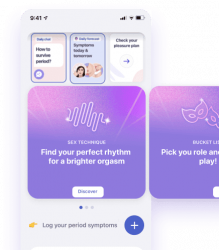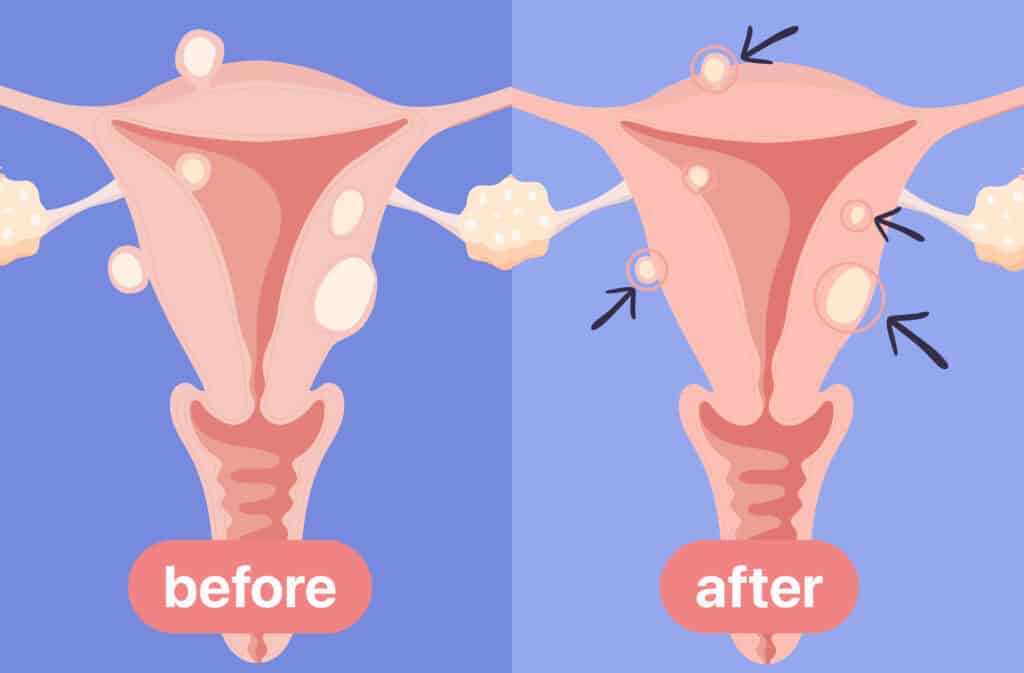Femia > Health Library > Your cycle > Sex > First time sex tips: How to make your first time pleasurable and painless
First time sex tips: How to make your first time pleasurable and painless

- Updated Feb 25, 2025
- Published
CRAFTED BY HUMAN
Crafted by human At Femia, we provide accurate and up-to-date information at every stage of your journey, from trying to conceive, pregnancy and postnatal support. All content is created by a real person based on in-depth research and own professional experience. Femia ensures that you will receive expert advice, strict accuracy and a personalized approach from our authors/medical experts. Learn more about our editorial policy.
FACT CHECKED
Fact checked At Femia Health, we maintain the highest standards of editorial excellence in delivering content focused on helping you conceive, guiding you through pregnancy, and supporting you postpartum. Explore our content review principles to learn how we ensure the accuracy and quality of our health and lifestyle tips for every stage of your journey.
First-time sex can be both exciting and nerve-wracking. The key to a positive experience is open communication with your partner, mutual respect, and taking things slowly. Understanding your body, ensuring both of you are comfortable, and using protection are essential for a safe and enjoyable experience. Remember, there is no rush—take the time you need, and don’t be afraid to speak up about your feelings and comfort levels.
It’s normal to feel anxious and nervous when it’s your first time having sex because you haven’t done it before and don’t know how things will go. But, by preparing and communicating a few things beforehand with your partner and taking things gradually, your first time can become a pleasurable and fascinating experience.
If you are anxious and looking for first-time sex tips to minimize pain or discomfort and first-time sex positions, we have got you covered.

What does losing virginity mean?
“Losing virginity” typically refers to the first sexual intercourse, often involving vaginal penetration. However, the idea of virginity being marked by the breaking of the hymen is a misconception, as the hymen can stretch or tear from various activities, not just sex. Virginity has no medical or scientific definition and is primarily a cultural concept, with its meaning varying widely among individuals and cultures.
Tips for first-time sex
The most pleasurable and easiest way to have sex is when you’re fully aroused. Remember, it’s not just the act itself, but the whole experience—from warm greetings, and respecting boundaries, to intimate moments like cuddles and kisses—that makes it enjoyable. Here are some practical tips to enhance sexual arousal and ensure a pleasurable first-time experience:
1. Set realistic expectations
Setting realistic expectations before first-time sex is key to having a positive experience. Understand that it’s normal for things to feel awkward or not go perfectly. Sex is about connection, communication, and comfort, so take things slow, be patient with yourself and your partner, and focus on mutual enjoyment rather than perfection.
👉Find out more: Is it safe to have sex while on your period? Everything you need to know
2. Set the relaxed atmosphere
To set a relaxed and romantic atmosphere before your first sexual experience, choose a quiet, private space where both partners feel comfortable. Soft lighting, such as dim lamps or candles, along with cozy touches like blankets and pillows, can create an intimate mood. Add soothing music to enhance the environment, ensuring it’s free from distractions and interruptions.
Start with simple, intimate gestures like holding hands, hugging, or cuddling to ease any tension. Set the mood with calming activities, such as enjoying a quiet dinner or watching a favorite movie together. Open and positive communication is key—talk openly about your feelings, desires, and boundaries. Taking your time and focusing on enjoying each other’s company will help both partners feel more at ease, making the experience more enjoyable and less stressful.
3. Talk to your partner
Preemptive communication is key to making intimate experiences more enjoyable and less stressful. Discussing likes, dislikes, and comfort levels beforehand can prevent misunderstandings and set the stage for a positive experience. Express concerns, get comfortable and ensure mutual consent. Respect each other’s boundaries, avoid pressure, and only proceed when both partners feel ready.
@femia.fertility Communication is essential if you want to reach your common goal 🌟 Here are 4 empowering prompts to help you speak freely about your desires with your partner! 💬✨ #relationshipadvice #lovetok #couplestok #advicetok #couplequestions #conversationstarters #relationships #health #communication #desire #pleasure ♬ Fragility - Flawed Mangoes
4. Foreplay: Get turned on
After some romantic moments and quality time with your partner in a relaxed and comfortable environment with open communication, the second step is foreplay. Any sexual activity you engage in before having intercourse is termed foreplay, which includes:
- Slow touching: Gently caressing each other to build intimacy.
- Holding hands: A simple gesture to feel connected.
- Kissing: Passionate or soft kisses to increase arousal.
- Cuddling: Snuggling close to create a sense of warmth and comfort.
- Warm hugs: Sharing an affectionate embrace to feel loved and valued.
- Clitoral stimulation: Key for female orgasm and enhancing pleasure.
- Increased sexual stimulation: Enhances lubrication and blood flow, preparing the body for intercourse.
Foreplay not only improves sexual arousal but also helps reduce discomfort during intercourse by increasing natural lubrication.
5. Choosing the right contraception
Choosing the right contraception is an essential part of ensuring a healthy and stress-free sexual experience, especially when you’re not ready to have children. Here’s what you should consider:
- Understand your options: Choose from hormonal methods (birth control pills, patches, injections), barrier methods (condoms), IUDs, or natural methods (fertility tracking). Each has pros and cons.
- Consult a healthcare provider: A doctor can help you select the method that suits your health needs and lifestyle, explaining the effectiveness and side effects.
- Consider long-term vs. short-term options: IUDs or implants are great for long-term use, while pills or condoms offer more flexibility.
- Emergency contraception: Know how emergency contraception (e.g., Plan B) works if contraception fails or you have unprotected sex.
- Consistency is key: For contraception to work, it must be used correctly and consistently.
Using protection during sex is crucial to prevent unintended pregnancies and protect against sexually transmitted infections (STIs). Condoms are often the go-to option because they provide a barrier that reduces the risk of both pregnancy and the transmission of STIs. They are widely available, easy to use, and effective when used correctly. Unlike hormonal methods, condoms do not require a prescription or doctor’s visit, making them a convenient choice for many.
6. Use lots of lubrication
Using a water-based lubricant during first-time sex is an essential step for ensuring comfort and minimizing pain. Here’s why it’s so important:
- Reduces Friction: Lubricant decreases friction, which helps avoid discomfort and irritation that may arise from vaginal penetration. This is especially helpful for first-time sex, where natural lubrication might not be sufficient.
- Eases Penetration: Many people experience difficulty or pain during penetration if there isn’t enough natural lubrication. A lubricant makes penetration smoother, reducing pain and potential tearing.
- Enhances Comfort and Pleasure: Lubricant not only makes things more comfortable but also helps enhance pleasure by allowing for more fluid movement. This creates a more enjoyable experience for both partners.
- Safe and Convenient: Water-based lubricants are safe to use with condoms and are easy to clean up afterward. They are gentle on the body and won’t cause irritation.
Incorporating lubricant into your first-time sex experience can significantly improve the comfort level and help ease any anxiety, ensuring a more positive and enjoyable encounter.
7. Pick a position
When it comes to first-time sex positions, comfort and communication are key. Choosing positions that allow for slow, gradual movements can help minimize discomfort and make the experience more enjoyable. Commonly recommended positions for beginners include the missionary position and woman on top, as they offer control and ease. For more detailed information about first-time sex positions, check out the section below.
8. Listen to your body
One of the most important aspects of sexual intimacy is listening to your body. Here’s how being attuned to your body can make the experience more enjoyable:
- Recognize comfort levels: Communicate any discomfort to your partner if something doesn’t feel right.
- Pacing and adjusting: Continue at your pace if comfortable, or adjust if discomfort arises.
- Pay attention to emotional cues: Acknowledge and share any feelings like nervousness or excitement with your partner.
In any sexual experience, your body is the best guide. When you listen to it, you’ll know what feels right and when to pause or continue, ensuring a fulfilling and respectful encounter for both you and your partner.
9. Aftercare
After sex, try practicing some aftercare with your partner. Aftercare will boost physical and mental relaxation, reduce anxiousness, and provide reassurance that you are valuable to your partner apart from your physical needs.
- Cuddling and affectionate gestures: Engage in cuddling, forehead kisses, or light massages to promote relaxation.
- Warm compresses: Apply warm compresses on the pelvic and abdominal areas to relieve discomfort, spasms, and cramps.
- Physical reassurance: Reassure your partner of their importance, expressing affection and care.
- Communicate: Share what moments you enjoyed and discuss any discomfort or preferences for next time.
Aftercare enhances physical and emotional well-being, fostering connection and mutual respect between partners.
Best sex position for first-time sex
Generally, first-time sex position varies for each individual and is where you are most comfortable. But, the two positions that offer better control of speed and depth during sexual penetration include:

1. Missionary
Missionary, or vaginal sex position, is a good starting point as it includes contact with your outer genitals. Your genitals are the main area in which you will feel sexual pleasure. That’s why missionary is a great position to enjoy and feel aroused, especially when it’s your first time.
In addition, it gives better control over insertion and penetration. You will be able to reduce the speed of penetration when you feel pain.
2. Woman on top (cowgirl)
Woman on top is another great position for first-time sex, as it gives the female control and helps them feel more secure and comfortable.
Moreover, this position allows an easy exit for women without relying on their partners if they feel too much pain or discomfort.
3. Spooning
Spooning involves both partners lying on their sides with the man behind the woman. This position is comfortable and cozy, offering closeness while being gentle on the body. It allows for intimate contact and provides the woman with a sense of security, making it ideal for first-time sex.
4. Side-by-side position
In the side-by-side position, both partners lie on their sides facing each other. This position is comfortable and intimate, allowing for easy communication and less strain on the body. It’s a great choice for those who want a slower, more relaxed pace during their first time.
👉Find out more: Does period sex make you more attached? Exploring the emotional and spiritual aspects
Contraception and protection
The cervix of young females may be more susceptible to infections, as it is in an immature state or being exposed for the first time to sex. Using protection during sex, like condoms, not only helps prevent sexually transmitted diseases (STDs) and infections but also reduces the risk of unintended pregnancy. Always check the expiration date of condoms before using them, and opt for water-based lubricant to prevent breakage during intercourse.
How to use a condom: Step-by-step instructions
Here are the step-by-step instructions on how to use a condom:
- With clean hands, carefully open and remove the wrapper from the condom.
- Start by wearing the condom on the head of the erect penis.
- Gently squeeze the tip of the condom to pinch the air out.
- Unroll and stretch the condom to the bottom of the penis.
- To remove the condom after intercourse, hold the penis from the base and pull it out while keeping the condom in place.
- Throw the condom in the trash, and don’t reuse it. Moreover, avoid using more than one condom at a time.

First-time sex Q&A
Having sex for the first time: How do I know if I’m ready?
When deciding to have sex for the first time, it’s important to consider emotional and physical readiness. Here are key factors to keep in mind:
- Emotional readiness: It’s important to feel comfortable, respected, and truly ready. Make sure both of you are on the same page and have open communication, trust, and mutual respect.
- Physical readiness: Understand your body and what to expect. Use contraception to keep you both safe from pregnancy and STIs. It’s essential that both partners are healthy and comfortable.
- Relationship stability: Being in a loving, stable relationship where both of you respect each other’s boundaries is key to feeling safe and relaxed.
- Mutual desire: The decision should come from both partners, not from pressure. It’s okay to take your time and wait until it feels right for both of you. There’s no rush.
Does sex hurt the first time, and how do you minimize pain?
It’s normal to feel some discomfort: It’s totally normal to feel a bit of discomfort or pain the first time due to the stretching of your vaginal tissues or, in some cases, the breaking of the hymen. The hymen is more flexible than we think: Many people believe the hymen breaks only during penetrative sex, but it can actually tear from everyday activities like exercise, using tampons, or physical exertion. It also doesn’t fully cover the vaginal opening, allowing menstrual blood to flow out.
Ways to minimize discomfort:
- Use lubrication: Lubricant can make things much smoother and more comfortable.
- Take your time with foreplay: This helps your body become more relaxed and naturally lubricated, making penetration easier.
- Talk openly with your partner: Let them know what feels good and what doesn’t, so they can adjust and help you feel more comfortable.
- Start slow and gradual: Ask your partner to go gently at first and allow your body to adjust. Take it one step at a time, and it will become easier.
- Trust your body: Remember, your body is naturally flexible, and it will gradually adjust. It might take a little time, but with patience and understanding, you’ll find what works best for you.
Will I bleed after having sex for the first time?
It’s normal to experience light bleeding or spotting after your first time. This can happen due to the stretching of vaginal tissues or the hymen breaking. Keep in mind that the hymen can also tear from activities like exercise or tampon use, not just sex. Here are some tips on how to deal with bleeding:
- Stay calm: A small amount of bleeding is usually nothing to worry about. If it’s light and stops after a few hours, it’s likely due to the reasons mentioned above.
- Use a towel before sex: Place a towel underneath you to catch any potential blood, making you feel more comfortable.
- Give yourself time: If you’re experiencing some discomfort or bleeding, it’s perfectly okay to take a break, rest, and let your body heal. Don’t feel rushed to continue; go at your own pace.
- Use protection: Make sure you’re using protection, like condoms, to prevent infection and reduce the risk of sexually transmitted infections (STIs), which can also cause discomfort or bleeding.
- Use a pad after sex: If bleeding occurs, a pad can help manage any spotting or discomfort
- If bleeding continues or is heavy: If the bleeding doesn’t stop after a few hours or becomes heavier, it’s best to consult with a healthcare provider to rule out any underlying issues.
Remember, every experience is different. What matters most is feeling comfortable and safe, so communicate openly with your partner and take things at a pace that feels right for you.
Will I have an orgasm?
It’s important to understand that not everyone experiences orgasm during their first time, and that’s perfectly okay. Many factors influence orgasm, including emotional comfort, physical relaxation, and communication with your partner.
How to boost your chances of having an orgasm:
- Focus on relaxation: Make sure both you and your partner feel comfortable, relaxed, and connected. Stress or anxiety can make it harder to reach orgasm.
- Communicate openly: Let your partner know what feels good for you, whether it’s certain touches or a specific rhythm.
- Take your time: Orgasm is often easier when you’re not rushing. Enjoy the process and allow your body to respond naturally.
- Incorporate foreplay: Engaging in activities like kissing, touching, or oral sex can help increase arousal and improve the chances of reaching orgasm.
Remember, every sexual experience is different, and it’s okay if you don’t have an orgasm the first time. What matters most is your comfort and communication with your partner.
Questions from the Femia community
How long should foreplay last?
Foreplay can last as long as you want. If you are enjoying foreplay with your partner and want to do more, you can do it until you physically and mentally feel the need to proceed to sexual intercourse. Foreplay should last until both partners feel comfortable and aroused enough to proceed. There are no defined specifications or time limits.
Is it possible that a penis won't fit into a vagina?
It’s very unlikely that a penis won’t fit into a vagina, as the vagina is a flexible and muscular organ that can stretch to accommodate various sizes. However, discomfort may arise if you’re anxious or not fully aroused, as this can cause the vaginal muscles to tense. Using lubrication and taking your time can help make the experience more comfortable and ease any initial discomfort.
How long will first-time sex last?
The duration of first-time sex varies greatly and depends on factors like comfort, arousal, and emotional readiness. For many people, the first experience may be shorter than they expect due to nerves or unfamiliarity. It’s important to remember that there’s no set “right” length of time—it’s more about comfort, connection, and enjoying the experience, rather than focusing on how long it lasts.
What should I do if I feel too nervous?
Express your feelings to your partner, take things slowly, and engage in activities that make you relax before starting sex. For example, open communication about your concerns, have fun or romantic talks, watch a romantic movie together, and share warm hugs. Make yourself as comfortable as possible. Remember that it's okay to stop, even just for a little while, if you feel any discomfort, uneasiness, or pain.
What is a good age for first sex?
The right age for first sex is highly personal and varies for each individual. It’s important to be emotionally and physically ready, ensure mutual consent, and have open communication with your partner. Legal age of consent varies by location, so be sure to understand the laws in your area as well.
The bottom line
A positive and pleasurable sexual experience requires consent and relaxation from both partners. If you feel nervous, remind yourself that you have the option to stop any time you face discomfort or uneasiness.
Foreplay and open communication with your partner during the entire process, along with making efforts to understand each other’s concerns or boundaries, are the key elements of a positive sexual experience.
Remember, it’s not important to rush everything all at once, especially when it’s your first time. Taking things gradually will help build an emotional and physical connection with your partner and make your sex even more intimate.
References
- “Women’s Sexual Health: Talking About Your Sexual Needs.” Mayo Clinic, 19 Jan. 2024, www.mayoclinic.org/healthy-lifestyle/sexual-health/in-depth/womens-sexual-health/art-20047771.
- Professional, Cleveland Clinic Medical. “Vagina.” Cleveland Clinic, my.clevelandclinic.org/health/body/22469-vagina.
- Denney, Nancy Wadsworth, et al. “Sex Differences in Sexual Needs and Desires.” Archives of Sexual Behavior, vol. 13, no. 3, June 1984, pp. 233–45. https://doi.org/10.1007/bf01541650.
- Institute for Quality and Efficiency in Health Care (IQWiG). “Overview: Premature Ejaculation.” InformedHealth.org – NCBI Bookshelf, 23 Sept. 2022, www.ncbi.nlm.nih.gov/books/NBK547548/#:~:text=That%20depends%20on%20many%20factors,to%20over%20half%20an%20hour.
- “Protection at first sexual intercourse among adolescent girls and young women in Kenya.” NCBI, 27 July 2020, www.ncbi.nlm.nih.gov/pmc/articles/PMC8024200.
- “How to Use a Condom.” Condom Use, 3 Apr. 2024, www.cdc.gov/condom-use/resources/external.html.
- “RAINN: The Nation’s Largest Anti-Sexual Violence Organization.” RAINN, www.rainn.org/.
- Professional, Cleveland Clinic Medical. “Hymen.” Cleveland Clinic, my.clevelandclinic.org/health/body/22718-hymen.

Did you know your clitoris can be the key to unlocking your orgasm? Follow this guide for enhancing your clitoral satisfaction, and maximizing your sexual experience.

Discover how to shrink fibroids naturally at home with diet, lifestyle changes or medical treatments and when to see a doctor.

Discover what’s happening at 7 weeks pregnant, including baby growth milestones, pregnancy symptoms, and how to support your health with diet and care.

